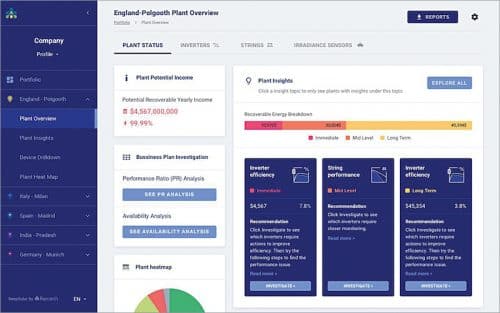Since the past few years, the renewable energy sector has witnessed profound growth. Among all the clean energy sources, solar energy has undoubtedly taken the world by storm. But just setting up solar equipment is not enough. Proper maintenance and management are necessary to make the most out of this long-term investment. Reducing operational costs and thereby boosting return on investment (ROI) is not an easy task for service providers or customers since challenges vary with factors like environment, regulations in an area, business model, and more.
Founded in 2015, Raycatch is a renewable energy startup that aims to make the solar energy market more efficient, accessible, and profitable through automated management and optimisation of solar assets. In this direction, the startup has developed a hassle-free, user-friendly, and platform-agnostic digital asset management system called DeepSolar for solar photovoltaic (PV) plants.
The artificial intelligence (AI)-based innovation uses algorithms and deep learning techniques fed inside it to analyse the existing plant data, identify patterns and assign them to the respective root cause while eliminating any data noise in the process. It is easy to integrate the system with pre-existing supervisory control and data acquisition (SCADA) and monitoring systems. Hence, all the high-volume data is available in a single consolidated dashboard. Besides being easily deployable in any plant, regardless of the size, the architecture is secure and scalable.

The system works as a high-precision diagnostics system to provide an overall view of every PV asset with a focus on the plant’s true state of health and any factor that leads to deterioration in performance. The cloud-based automated platform also lists detailed ways of solving such issues priority-wise and their economic feasibility in real time. A clear distinction is maintained between recoverable and non-recoverable energy sources.
The actionable insights provided on a daily basis aid plant owners, asset managers and operators in better management of their portfolio and decision making for profitable energy yields. Being a SaaS (software as a service) model in nature, it requires no installation, additional hardware, or the like, which reduces the costs on the customer’s end. Even an IT non-professional can work on it and make calculated ROI based decisions that maximise the internal rate of return (IRR).
In 2019, the startup was announced as one of the winners of the Intersolar Award for showcasing its next-generation solution in Germany. As of now, the company globally enhances over 4GW in solar assets. Recently, the company released a new system update, DeepSolar 2.5, which focuses mainly on remote diagnostics and prioritisation of performance issues. The issues that require long term work like revamping of projects or manufacturer warranty claims are pushed for the future. Also, new features like efficiency over time and efficiency below spec graphs comply with the euro efficiency standard.







